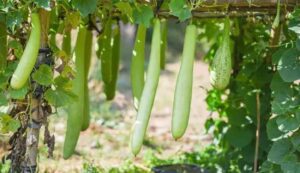Farming Tips: Now vegetables will not be ruined by rain, just do this tough work
Farming Tips: Near the hamlet of Dayalpur, near Faridabad, farming has evolved from a custom to a synthesis of technology and thought. Deepak, a village farmer, has been growing bitter gourd and zucchini in his land in a novel method. Instead of growing veggies on the ground in the field, he has done it on nets. The benefit of this is that the crop’s quality has increased and the impact of spiders and insects has decreased. The vegetable cultivated on the net stays safe throughout the wet season, whereas the produce planted on the ground rots.

Installed Nets to begin farming
Deepak said that he works for Wipro and is an IT specialist by trade. He makes time for farming since he works from home. I was raised in a farming family; therefore, I believe that farmers should also benefit from my schooling, Deepak said. As a result, I’m always considering doing something else in farming. Using bamboo to build netting, he planted bitter gourd and zucchini in one acre. On the ground underneath the net, cucumber and beetroot have also been planted.
What are the advantages of using the net technique for farming?
Deepak said that his uncle, who farms in Hapur in various ways, gave him the idea to farm in this manner. He claims that growing on nets lowers labor costs and prevents produce spoilage from rain. The total cost of this system is around 65 thousand rupees. Instead of using seeds, he planted saplings, and he did not apply any chemical fertilizer or pesticides to the crop.
Middlemen exploit laborious efforts
To keep fruit flies away, he set up traps. Deepak’s goal is to establish a direct line of communication between the farmer and the consumer so that the latter may purchase pure veggies and the former can get fair compensation for his labor. “I would like to establish a platform in Faridabad that would allow fresh and organic vegetables to be delivered straight from the farm to the kitchen,” he added. A while back, the market price of tori was between 7 and 10 rupees per kilogram, but now it is between 35 and 40 rupees per kilogram. According to Deepak, intermediaries, not farmers, benefit the most from the market. I want this disparity to stop.

